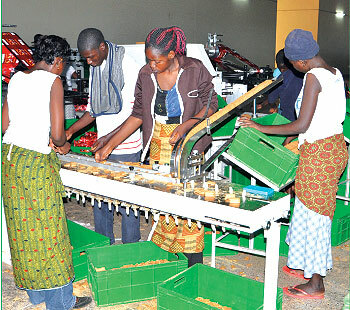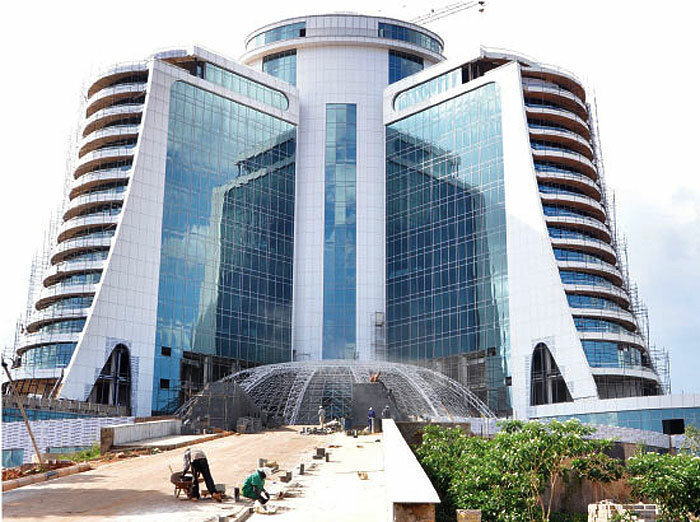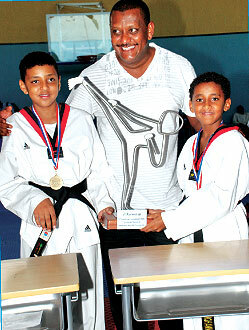I juggled business, books at eight years
I came to Uganda in 1987 after my high school to visit my elder brother, Mohammed El Hamid, the owner of Pan Afric Impex. I was supposed to proceed to the US for my university education on the advice of my father.
HILTON HOTEL OWNER
Mohammed Hamid tells PAKASA how he transformed himself from a street vendor to a billionaire
COMING TO UGANDA
When and why did you decide to come to Uganda?
I came to Uganda in 1987 after my high school to visit my elder brother, Mohammed El Hamid, the owner of Pan Afric Impex. I was supposed to proceed to the US for my university education on the advice of my father. But I fell in love with the country and decided to stay.
Why did you decide to stay in Uganda?
I just loved the country. The people were warm. I saw lots of opportunities and had the backing of my elder brother.
STARTING OUT IN BUSINESS IN UGANDA
What was the first business you attempted in Uganda?
After working with Pan Afric Impex for some time, I decided to start my first company, Pan Afric Commodities, in the early 1990s. We dealt in general merchandise; both import and export. I imported all sorts of items like vehicle tyres, juices and wheat flour. I influenced the popularity of chapatti as a meal of choice among Ugandans.
And how did you move into milling and other businesses?
After realising there was a big demand for wheat locally, I bought a milling machine from Premiere Mills, a firm owned by businessman Sudhir Ruparelia in industrial area, Kampala. We then moved the machinery to Kawempe, where I had acquired a 15-acre piece of land in 1997.
How did you accumulate enough capital to go into manufacturing?
I made a lot of profit trading in general merchandise and by the time I decided to move into manufacturing, I had accumulated enough capital. I spent about $1.5m (about sh3.5b now) to set up the industry. The machinery alone cost $1.3m. 
How did you move from that one mill to the diversified manufacturing empire you are running today?
As the milling business grew, we realised we would make a lot of money if we added value to the wheat flour. There was a lot of market for baked products and confectioneries.
In 2000, with the help of a loan from the Export Import Bank and my savings, I bought more mills and expanded into the bakery and biscuits-making sections. We set up one mill at a time until they became three.
But you are also into transportation. What did fleets of trucks have to do with what you were doing?
As a manufacturer, I soon realised the cost, time and inconvenience of getting a decent transporter for our raw materials from Mombasa to the factory. So, we decided to start our own transport company called Fifi Transport in 2004. Workers at Aya Biscuits in Kawempe
Today, we have a fleet of over 200 trucks ranging from small three-tonne trucks to 60-tonne trucks serving mainly our internal transport needs. However, occasionally, we hire them out for commercial use.
Any other business you own locally and abroad?
I also own a company called AYA Investments, which invests in big local projects like the Hilton Kampala Hotel.
I am currently into construction and mining locally.
In Dubai, I own a trading company that deals in general merchandise across Middle East and Africa called Aya Mohammed Trade plus a real estate firm in Manhattan, New York, USA, that deals in both residential and commercial properties.
You have talked about being in the mining business. This is new. Tell us more about this venture I acquired an exploration and mining licence in Karamoja for gold through my AYA Mining company. However, I haven’t yet struck major gold in spite of the fact that exploration has been going on for some time.
Putting all your ventures together, what do you think is your total net worth?
Considering all my businesses, I will put it at about $400m.
I juggled business, books at eight years
The AYA estate
AYA Investments (U) Ltd Manages a diversified portfolio of industrial and commercial real estate. One of the division’s principal projects is the development of Hilton Hotel.
AYA Mills
AYA Mills operates one of the largest commercial milling facilities in East Africa and is home to some of the region’s finest flours. The facilities utilise modern equipment, including state-of-the-art Ocrim mills, which are capable of producing up to 8,500 tonnes of flour per month.
AYA Mining
Last year, the AYA Group established the first gold mining facility in Uganda. The project is expected to expand its operations into the processing of metal from other east African nations.
AYA Biscuits
Aya Biscuits operates the newest and most modern biscuit-making facility in Uganda, utilising the latest Polin Machinery imported from Italy.
Pan Afric Commodities Ltd
The leading millers of wheat flour in Uganda, the company’s mills are located in Kawempe, Kampala. Pan Afric Commodities was one of the 10 finalists in the 2005 Investor of the Year Awards.
FIFI Transport Uganda Ltd
A leading hauler in the east and central African region, the company has state-of-the-art trucks capable of handling containerised and bagged freight. Major routes of FIFI Transport include the port of Mombasa in Kenya and Kampala. They also operate in Southern Sudan.
Aya Bakery (U) Ltd
The largest commercial bakery in Uganda, the company supplies fresh bakery products daily to Kampala and central Uganda.
Hilton Hotel a landmark in Kampala
Last decade, you ventured into hotels and are setting up Hilton Hotel, one of the most visible landmarks in Kampala. Tell us about this project.
The hotel will be operated by Hilton International. We intend for it to be Kampala’s number one address for tourism, leisure and entertainment and one of the best hotels in Africa.
It is designed to the highest international standards with a dramatic palm-lined road that leads to a domed five-storey atrium and a sculpted 22-storey tower. We set up in grounds with a waterfall. We are hoping that this will become an internationally-known landmark for Kampala.

Hilton Hotel has 272 luxury suits. Inset: One of the rooms
We have built about 272 luxury suites and guest-rooms offering an unparalleled range of facilities with three restaurants and two bars for entertainment, a large health and beauty spa, conference and meeting facilities for over 1,000 delegates and ballrooms for private functions.
Upon completion, how much do you estimate it will have cost?
The entire project will cost $150m (sh350b) by the time it’s done. We hope that will happen this year.
Why did you decide to venture into such a challenging and expensive project?
I started the project in 2006 and it was inspired by a number of factors. First, I have travelled around the globe and have hosted a number of my friends and business partners here, who always wondered why such a beautiful country doesn’t have a landmark like a five-star hotel. This is one of the reasons I decided to undertake this project.
Secondly, I make a lot of money from this country. I feel obliged to add something of a landmark; something that will have my name on 50-70 years from now for all the good I have got from Uganda.
I also believe undertaking such a project that will employ over 2,000 Ugandans directly and bring in a lot of foreign exchange is a way of giving back to Uganda and its people for the business, support and the warmth they have accorded me.
I also love taking on big challenges. That is exactly what this project was for me when I first conceptualised it.
This project has had a number of ups and downs, including some nasty legal battles and has also delayed completion, what do you think was the cause of all this?
Yes, there is a lot of envy from people, who are fighting the project for their own gain. They are trying to sabotage us; exaggerating things and painting the entire project negatively.
Then there are people second-guessing us, while others are claiming we hijacked the land on which the hotel stands. These people want to see the project fail.
This project is also a very detailed and complex piece of architecture, so it takes time to bring out the finer details. That is the other reason it’s taking time.
Aside from the challenges you have faced with the hotel, what other challenges have you faced doing business in Uganda?
Bureaucracy, especially in government departments, which slows vital business processes. Acquisition of licences is a major challenge to businesses, for example. Corruption among politicians, who are looking for kickbacks from businessmen is a pain. Sometimes they go as far as trying to fail you by fighting you because you refused to bribe them.
Helping the needy
Tell us about AYA foundation.
The foundation started five years ago. It looks after orphaned and under-privileged children around the country and aims to give them a better future through education, sports and taking care of basic needs like housing, feeding and medication.
We have created jobs for over 500 youths and built the biggest mosque in Mpigi district.
What makes him tick
Through your full-time business career that spans over 20 years, what are those qualities that you think have propelled you to the top?
I do business with a passion, not just for money. It is not about how much I gain at the end of the day, but about how we all can benefit.
I am very observant and always looking out for new business opportunities as I go about my day-to-day business and work.
I am a religious person and believe in God, which I think has played a key role in my success. 
I also work very hard and give whatever I do my best, which has helped me overcome many obstacles and enabled me to come this far.
I like to think of myself as a very creative individual.
Business plans
So what plans do you have for AYA Group of companies?
I plan to set up industrial parks to add value to agriculture and create employment for Uganda’s youth. I am planning to set up at least three across the country. I am still negotiating with the Government and other relevant authorities on this project.
I am in advanced stages of finalising with some investors from the Middle East for an arrangement where they provide us with the latest technology in manufacturing and we, in turn, export finished products to them.
I am also always looking for new opportunities and always ready to invest in viable and feasible ones through the investment arm of my businesses — AYA Investments.
With his sons